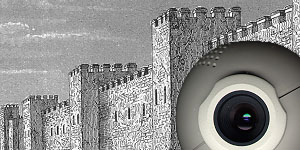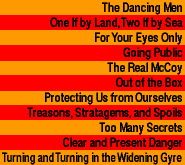


Turning and Turning in the Widening Gyre
Liberty cannot be preserved without a general knowledge among the people.... The preservation of the means of knowledge among the lowest ranks is of more importance to the public than all the property of all the rich men.We have erected safeguards against anyone knowing how we vote because we've had thousands of years to experience what happens when we don't protect that information. We know that voting information can be easily misused, so we don't even let our own governments have it. Until now, however, we've had no such experience with letting anyone know what we buy, what we read, what we eat, what we do, how much we earn, where we live, what we think. Most of us, ignorant of privacy systems now available, give all that information away.
John Adams,
Dissertation on the Canon
and Federal Law
Information is money. If you know a little about many people, or a lot about some people, you can make more money than if you don't. Information is a commodity. It's something you can buy and sell, mine and refine, repackage and resell, just like any material resource. Now that the secret design of a company's next-generation product is worth far more than the raw materials needed to build it, information will become the oil and wheat and iron of the twenty-first century.
Information is also power---the strongest drug in the world. All governments run on wheels within wheels that they rarely let their own populace see. To protect reputations, to win elections, or simply through greed, career-minded officials have been known to bury damaging information. To gain a political edge, even friendly nations spy on each other; and to gain an economic edge, unfriendly nations arm each other. Power has always been a game of politics over justice, propaganda over truth, expediency over morality. Nations are no more moral than the people they represent.
Because many of us dislike hearing such things, all governments find it easier simply not to tell us. That pantomime practicality, that difference between what-we-say and what-we-do, creates and perpetuates the need for secrecy. It won't ever go away.
But while the game may not go away, technology can change its rules. Today's encryption technology could, if used widely enough, make us the last generation ever to have to fear for our privacy. On the other hand, if misused, it could make us the last generation with any notion of personal privacy at all. Our choices, it seems, are growing starker and starker.
We have come a long technological way from the ancient Egyptians, yet their lives were as filled with intrigue and secrets as ours are. Perhaps nothing will change the politics of information, whether it's the politics of Cleopatra and Julius Caesar, or of your cable company, bank, insurance company, police department, video store, grocery store, or government.
Our legal, governmental, and social systems are still designed for a world without computers. Our sluggish social systems, intended for the languid bygone era of only a decade ago---an era filled with filing cabinets, paper documents, and five-day mail---haven't changed to keep up. And computer technology keeps changing so fast now that perhaps they never will.